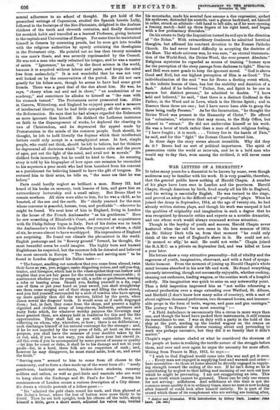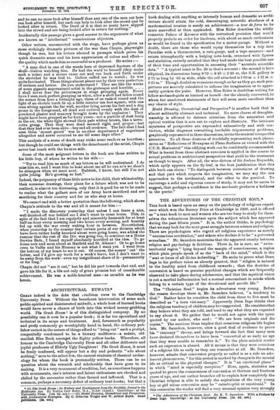WAR LETTERS OF A DRAMATIST.* IT takes many years for
a dramatist to be known by name, oven though audiences may be familiar with his work. It is very possible, therefore, that the general public knew nothing of Harold Chapin. A number of Ws plays have been sooa in London and the provinces. HaroM Chapin, though American by birth, lived nearly all his life in England, and his writing is essentially English. Ho was trained to the stage, and proved an adopt in the difficult art of " producing " plays. When he joined the Army in September, 1914, at the age of twenty-six, he had already written sixteen plays, and though hia work was unequal it had the qualities of originality and imagination in such a degree that he was recognized by dramatic critics and experts as a notable dramatist, and one whose work would always command serious attention.
Though in the heyday of youth and sueoess, Harold Chapin never hesitated when the call for men came in the late summer of 1914: As Mr. Sidney Dark tolls us, from that moment "he could only think of the war and of England's share in it. He could not act.
It seemed so silly,' he said. He could not write." Unpin joined the R.A.M.C. as a private on September 2nd, and was killed at Loos a year later.
His letters show a very attractive personality—full of vitality and the eagerness of youth, imaginative, observant, and with a fund of sympathetic humour. From the moment of joining up Harold Chapin's whole mind became absorbed in his new life and work. Ito found everything intensely interesting, though not necessarily enjoyable, whether cooking, cleaning out outhouses, loading wagons, or the routine work of a hospital orderly. His imagination was quick to seize on any noteworthy point. Thus a field inspection impressed him as "not unlike rehearsing a colonel production over a stage extending over Watford, St. Albans, and Hatfield (I don't know how many miles of country), with a oast of about eighteen thousand performers, two thousand horses, and innumerable props in the form of tents, wagons, and guns and gun carriages." The journey to Franco "was most amusing" :— "A Field Ambulance is uncommonly like a circus in more ways than
one, and though the band have packed their instruments, it still retains its resemblance to one. I was on duty with a party in the hold of the ship at the port, sending up the loaded wagons on the cranes on Tuesday. The number of clowns running about and pretending to work was perhaps excessive, but they did it so funnily that it didn't matter."
Chapin's eager nature chafed at what he considered tho slowness of the people at home in realizing the terrific nature of the struggle before them, and over and over again he urges the necessity for more effort. Writing from France in May, 1915, he says :— " I wish to God England would come into this war and get it over.
. . . Every man not engaged in supplying food and warmth and order— bare necessities—to those at home should be directly engaged in supplying strength toward the ending of the war. If he isn't doing so he is contributing by neglect to that killing and maiming of our men out hero which he might be preventing. I am not exaggerating an iota. This is mere truth which cannot be gainsaid. There can be only one reason for not serving : selfishness. And selfishness at this time is not the common-sense quality it is in ordinary times, since no man is now looking after himself or could look after himself entirely. He is part of the crowd which those of its complement who are serving are looking after, and he can no more look after himself than any one of the men out here can look after himself, but each can help to look after the crowd and be looked after in return. The Devil of it is that so many have slipped into the crowd and are being looked after in return for nothing."
Incidentally this passage gives a good answer to the arguments of what are known as " intellectual " conscientious objectors.
Other writers, unconnected with the stage, have perhaps given us more strikingly dramatic pictures of the war than Chapin, playwright though he was, but his letters abound in passages which prove his quick dramatic sense and his keen appreciation of colour and effect— the quality which made him so successful as a producer. He writes :-
"A man died in one of the wards here of depressed fracture of the akull—Calton watching him. He had the ward to himself (they make such a noise) and a mouse came out and ran back and forth under the stretcher he was tied to. Galton called me to watch ; he was quite fascinated. These things almost please one by their very perfection of eeriness and horror. Do yeu understand ? They are like the works of some gigantic supernatural artist in the grotesque and horrible. . . . I shall never fear the picturesque in stage grouping again. Never have I seen such perfect grouping as when, after a shell had fallen round the corner from here a fortnight ago, three of us rushed round and the light of an electric torch lit up a little interior ten feet square, with one man sitting against the far wall, another lying across his feet and a dog prone in the foreground, all dead and covered evenly with the dust of powdered plaster and masonry brought down by the explosion I They might have been grouped so for forty years—not a particle of dust hung in the air, the white light showed thorn pale whitey brown, like a terracotta group. That they were dead seemed right and proper—but that they had ever been alive—beyond all credence. The fact that I hail seen them 'mount guard' was in another departmen t of experience altogether and never occurred to me till some days alto r."
This analysis of a scene of death may strike some readers as heartless ; but though. ho could see things with the detachment of the artist, Chapin never lot touch with the human side.
Some of the most poignant letters in the book are those written to his little boy, of whom he writes to his wife :— " Try to read him as much of my letters as he will understand. I do miss him so, and I want him to hear about me all ho can so's wo shan't be strangers when we meet next. Rubbish, I know, but still rm not quite joking. He's growing so fast."
Indeed, the poignancy of these little notes to his child, their whimsicality, their nonsense drawings, their plane for a future which was not to be realized, is almost too distressing, only that it is good for us to be made to realize what the gallant men of our Army have sacrificed and are sacrificing for their country and for us who stay at home.
We canna end with a better quotation than the following, which shows Chapin's attitude to the war and all it meant for him :—
" I made the discovery yesterday that unless I can leave a nice, well-finished-off war behind me I don't want to come home. This, in spite of the fact that I am regularly and miserably homesick for at least half-an-hour every morning and two hours every evening, and heartily fed up with the war every waking hour in between. Nevertheless, when yesterday to the rumour that certain parts of our division which have been rather badly knocked about were going home, was added the rumour that the rest of the Div. was going too, to continue as a Home Service Batt., I found myself absolutely horrified at the idea. To go home now and mesa about at Hatfield and St. Albans ! Or to go home oven to Vallie and his Mummy is not what I want yet. I want from the bottom of my heart to see it out. Of course, the sooner ' out ' the better, and I'd give my teeth for a week's leave, but I don't want to be away from the work—even my insignificant share of it—permanently or for long."
Chapin did not "see it out," but he did his part towards that end, and gave his life for it, a life not only of great promise but of considerable achievement. He was a noble-hearted man—as sensible as he was heroic.













































 Previous page
Previous page